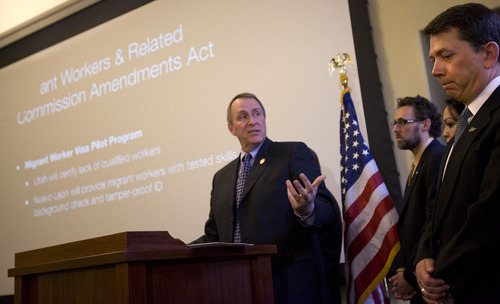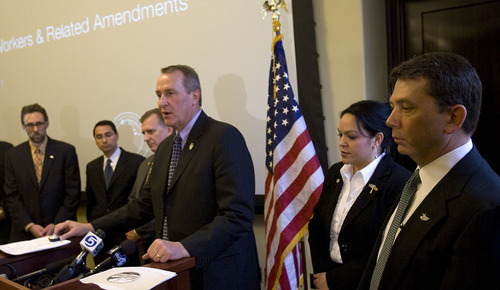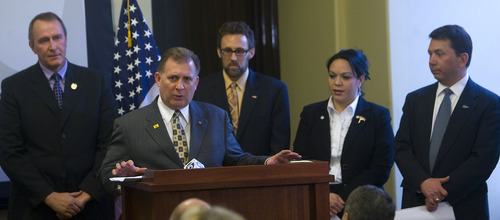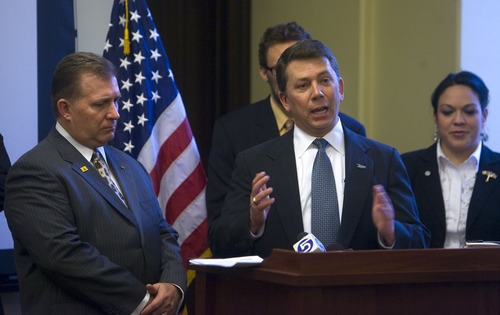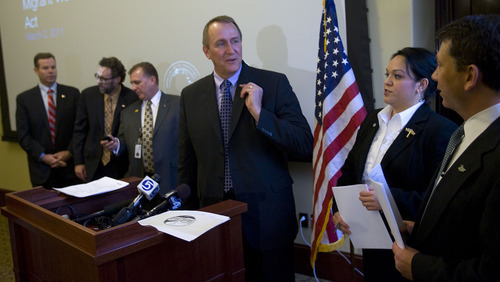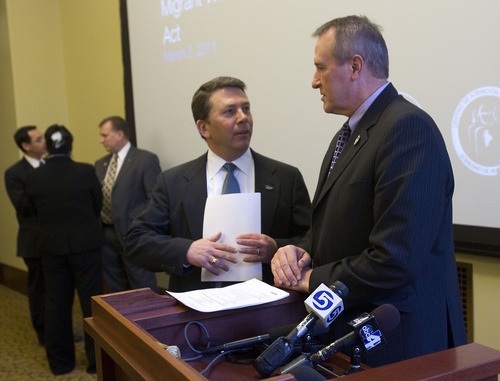This is an archived article that was published on sltrib.com in 2011, and information in the article may be outdated. It is provided only for personal research purposes and may not be reprinted.
Two lawmakers who have been at odds with each other on immigration legislation stood together Wednesday to jointly introduce a migrant worker bill that seeks to begin a partnership between Utah and a state in Mexico.
The bill, HB466, is sponsored by Rep. Stephen Sandstrom and co-sponsored by Sen. Curt Bramble and would allow businesses in Utah who need labor to directly solicit it through Nuevo Leon. The approach would work within federal guidelines where legal visas are distributed by the federal government with the state acting essentially as middleman.
Attorney General Mark Shurtleff, who helped draft the bill, said that while the proposal didn't address the estimated 110,000 undocumented immigrants currently in Utah, it would create a legal pipeline for workers to fill the needs of employers who can't fill jobs with citizens here.
Shurtleff said the proposal directly targets the primary reason immigrants come to the United States — work.
"They are waiting and ready to come to this country," Shurtleff said. "But they need a portal."
Sandstrom said he wanted to run the bill because he supports immigration and felt the bill was a legal way to do so. He said he doesn't support various guest worker bills that require a federal waiver to begin employing those already here without documents.
By working with Bramble, Sandstrom said it was also a chance to show people that "while we disagree on some issues... we do welcome immigrants."
The bill would establish a 25-member panel to oversee the process, including representatives from the governor's office as well as state-level elected officials and members of the public.
It would run for a year, after which Shurtleff said it would be reviewed. If it is successful, backers would seek to run the program for any country not on the State Department's list of terrorist countries.
Sen. Luz Robles, who is also pitching SB60 as a pilot program that seeks to allow those in the state to be accounted for and documented so they can work legally, said this bill was "a state solution that is a reality." Robles' bill is awaiting a chance to be heard on the Senate floor. It has been criticized for being unconstitutional — though she said she thinks the federal government would grant a waiver to run it as a pilot program.
The Bramble-Sandstrom offering, however, operates within the confines of federal law and requires it to issue H2 visas — something the state cannot do now.
Under the bill's provisions, the only way undocumented people in the state could apply for the H2 visa through the program would be if they had been in the country for less than 180 days. If so, they could exit the country and reapply. If they've been in the country without legal documents for a year, they would have to return to their home country and wait three years before being able to apply for the program.
Sandstrom said there is no fiscal note for the bill and there would be no cost to taxpayers.
One concern raised was Sandstrom's link to his enforcement-only bill, HB70, which was killed in committee Wednesday (see accompanying story) and is expected to be resurrected under a new title and new bill later this week.
When Arizona was about to enter a partnership with Nuevo Leon with a similar proposal, the Mexican state pulled out after its anti-illegal immigration bill, SB1070, was signed into law. While some worry Sandstrom's reworking of some of HB70 provisions in a different bill will still carry a tainted public perception, Sandstrom said that the new enforcement-only bill he is running "isn't Arizona-style" legislation.
The demise of HB70
The bill Rep. Stephen Sandstrom spent 10 months crafting, rewording and cutting was killed in a cutting 30-second speech by Senate President Michael Waddoups, leading to hugs and cheers in the hallway outside the committee hearing room Wednesday.
But the celebration didn't take into account the deal that will allow Sandstrom to bring back the bill under a different number and the removal of the words "reasonable suspicion" from it — an important step the Senate wanted to see happen before it moved forward on it.
"It is an enforcement piece of the puzzle that has polarized the citizens of this state so that no matter what happens to it, it becomes a problem for our state," Waddoups said. "I think this bill should be tabled so we can move on to the rest of the immigration discussion."
For Sandstrom, moving on means the new bill, formerly known as HB70, will keep many of the components of HB70. The key differences include giving local police the option to check legal status on Class B and C misdemeanors rather than requiring them to and officers can't use "reasonable suspicion" as a guideline in determining legal status.
That new bill, Sandstrom said, could be heard in the House by Friday.
"I've got my fingers crossed," he said.


